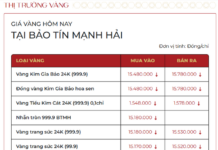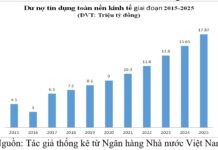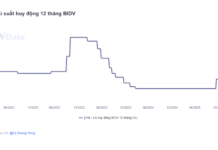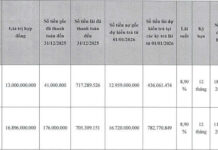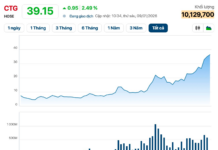
Experts sharing insights at the seminar |
The issue was discussed by experts at the seminar titled “Results of the First Year of the FTA Index – Emerging Issues,” organized by the Industry and Trade Magazine on October 3rd.
An Uneven Landscape
The Ministry of Industry and Trade’s introduction of the FTA Index in April 2024 marked a new approach to evaluating the implementation effectiveness of free trade agreements (FTAs) in Vietnam. Previously, studies and statistics primarily focused on the central level. However, the FTA Index, for the first time, examines the utilization and implementation of FTAs at the local level, where direct support for businesses, policy enforcement, and integration commitments are realized.
The 2024 FTA Index results reveal a diverse picture. The top 10 leading provinces include Ca Mau, Thanh Hoa, Binh Duong, Khanh Hoa, Tra Vinh, Long An, Ha Giang, Bac Lieu, Ninh Binh, and Dien Bien, with scores ranging from 31 to nearly 35. However, the national average score is only 26.2/100, and the lowest-scoring province stands at 14.49, highlighting significant disparities.
Mr. Ngo Chung Khanh, Deputy Director of the Multilateral Trade Policy Department (Ministry of Industry and Trade), attributes these differences primarily to leadership mindset and resource allocation. Some provinces have only one FTA officer handling a substantial workload, resulting in less in-depth business support. On the business side, most lack legal departments or FTA experts to leverage commitments, especially in new markets like the EU, Canada, or the UK.
Assoc. Prof. Dr. Dao Ngoc Tien, Vice Rector of the Foreign Trade University – the institution conducting the FTA Index survey and data analysis – emphasizes systemic factors. He notes that both authorities and businesses still do not fully regard FTAs as a long-term strategy. Many localities have weak connections with businesses, while government support is a decisive factor in rankings. Notably, some provinces with modest exports achieve high scores due to close collaboration between authorities and businesses.
Another standout feature is the variation in implementing sustainable development commitments. For instance, Ca Mau leads nationally with a very high score in this pillar, as both authorities and businesses recognize environmental protection and fisheries sustainability as critical issues.

Mr. Ngo Chung Khanh mentioned that after the FTA Index announcement, many major provinces and cities proactively contacted the Ministry of Industry and Trade for detailed guidance |
SMEs: A Major Bottleneck
Representing the business sector, Dr. Nguyen Van Than, Chairman of the Vietnam Association of Small and Medium Enterprises (VINASME), candidly observes that most SMEs are not fully aware of FTAs’ impact. Many remain focused on processing roles, lacking strategies to become professional manufacturers or traders to enter high-value, demanding markets.
Mr. Than highly values the establishment of the FTA Index, considering it a crucial national indicator that engages both local authorities and the business community. However, to maximize its effectiveness, he suggests incorporating the FTA Index into local ranking criteria. “If implemented, provincial leaders will immediately allocate resources, as the index becomes an official ‘benchmark,’ increasing improvement pressure,” he stressed.
Elevating the FTA Index
After the first year of implementation, according to Assoc. Prof. Dr. Dao Ngoc Tien, many localities have experienced a “wake-up call,” realizing that FTA execution falls short of expectations. Changes are evident in the development of specific plans and clear goals for industries and markets, moving beyond mere promotional seminars. Positively, more localities are prioritizing export businesses in their support efforts.
Mr. Ngo Chung Khanh also noted that following the FTA Index announcement, many major provinces and cities proactively contacted the Ministry of Industry and Trade for detailed guidance, from identifying weaknesses to formulating business support plans. This signals a shift in leadership thinking, though broader dissemination is still needed.
Experts suggest expanding the scope and enhancing evaluation methods to maximize the FTA Index’s value. Assoc. Prof. Dr. Dao Ngoc Tien proposes adjusting indicator weights, increasing the role of sustainable development and non-tariff preferences, which are long-term trends. Additionally, the survey scope should extend to cooperatives and collective economies, as they contribute to exports but remain unmeasured.
The Ministry of Industry and Trade, as stated by Mr. Ngo Chung Khanh, is collaborating with ministries, sectors, and localities to develop updated, practical evaluation questions. Provinces will receive specific guidance to improve results, not just for “score boosting” but, more importantly, for effective business support.
Experts also highlight that amidst global volatility, from countervailing taxes to protectionism, Vietnamese businesses must diversify markets. Mr. Khanh advises, “We cannot rely on a few markets. The EU, UK, Canada, Mexico… are major, potential destinations that should be integrated into business export strategies.”
According to Mr. Nguyen Van Than, alongside government support, businesses must proactively transform and invest to meet international standards, especially in demanding markets. This is the sole path to achieving sustainable development goals.
Anh Thơ
– 16:20 03/10/2025
Samsung Crowned Most Beloved Tech Brand at Better Choice Awards 2025
Samsung has been honored at BCA 2025 for its innovative technology localization strategy, groundbreaking product lineup, and significant investment in the Vietnamese market.
Long Châu Honored Among “Top 10 Impressively Growing Brands” at Vietnam Strong Brands 2025
On October 2, 2025, Long Châu Pharmacy and Vaccination Center was honored as one of the “Top 10 Impressively Growing Brands” at the 22nd Vietnam Strong Brand Awards, organized by VnEconomy – Vietnam Economic Times. This prestigious recognition not only acknowledges Long Châu’s relentless efforts in expanding its scale, driving innovation, and enhancing service quality but also underscores its unwavering commitment to serving and improving the health of millions of Vietnamese people.
Today’s Crypto Market, October 3: Unraveling the Controversy Surrounding Shark Binh’s Antex Project
As smaller Bitcoin holders begin to accumulate, larger investors continue to offload their holdings, creating a dynamic shift in the market.







